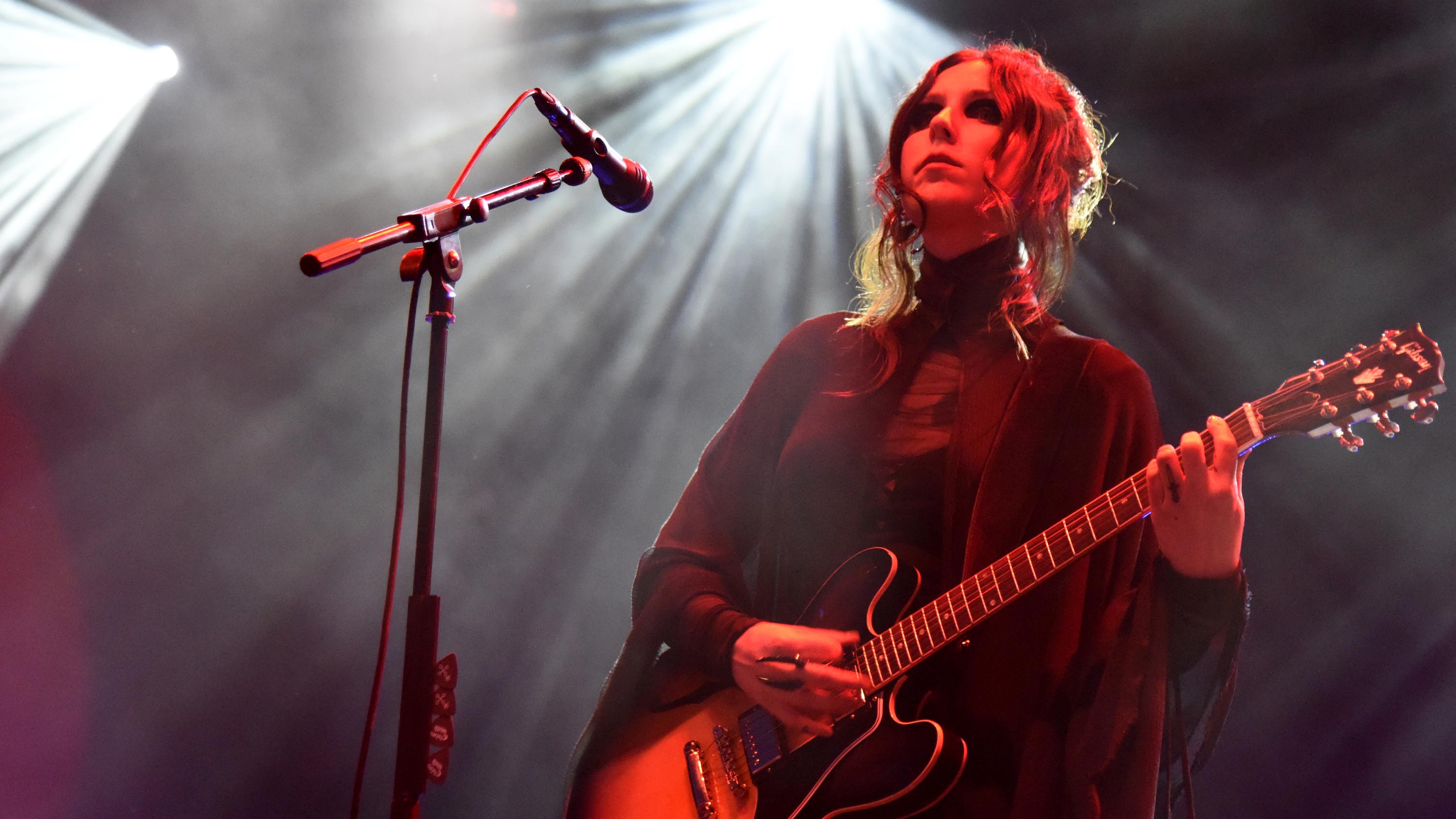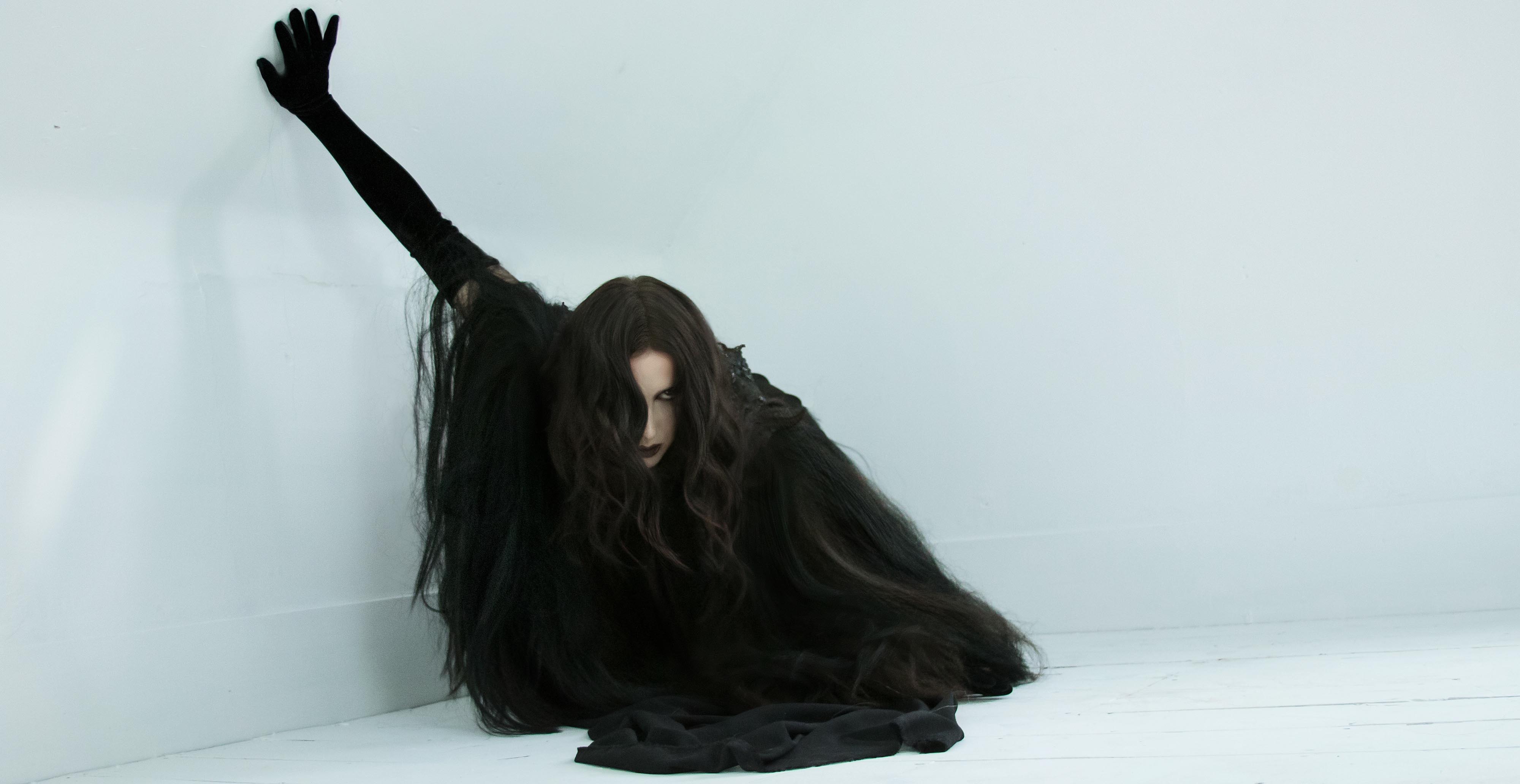Chelsea Wolfe talks Hiss Spun: "It was fun to write some songs that were more in-your-face and aggressive"
The colossal guitar tones and white noise of Wolfe's dark world

Want all the hottest music and gear news, reviews, deals, features and more, direct to your inbox? Sign up here.
You are now subscribed
Your newsletter sign-up was successful
The word ‘artist’ is used with witless abandon in music, but with Californian songwriter Chelsea Wolfe it feels wholly appropriate.
An originator and creator, over five albums she has constructed an intricate, dark body of work, one capable of crossing vast spaces, from gothic folk to black metal, while still feeling part of the same awe-inspiring aesthetic.
2015’s Abyss saw the Sargent House-signed songwriter develop a cavernous dynamic presence through gigantic, dystopian riffs, all contrasted with a tortured Cocteau Twins vocal. Now she has returned with Hiss Spun – a record that bathes in the bleakness of the current global outlook and delves ever deeper into musical extremes.
Produced by Kurt Ballou and featuring Queens Of The Stone Age’s Troy Van Leeuwen, it’s her heaviest album to date and something of a black mirror record – one that points aggressively at our ugliest tendencies and states: ‘what hath man wrought?’ or in 21st century terms: ‘look at this gigantic shit storm’.
We spoke to Chelsea about Hiss Spun, what it was like working with Troy Van Leeuwen and Kurt Ballou and the primordial origins of white noise…
This album was produced by Kurt Ballou at his GodCity studio in Salem, Massachusetts during the winter months. It really feels like you can hear that snow-quieted landscape on the likes of Vex or Two Spirit. How did that surrounding impact you and, by extension, the record?
The sense of the cold, quiet outside contrasted with the hissing radiators of the warm interiors is reflected on the record
“Yes, I think the sense of the cold, quiet outside contrasted with the hissing radiators of the warm interiors is reflected on the record. One of the reasons I wanted to record in Salem is because I fell in love with Kurt’s studio last year when I was there working on Converge Blood Moon.
Want all the hottest music and gear news, reviews, deals, features and more, direct to your inbox? Sign up here.
“Sometimes a building has no effect on the recordings, but sometimes it becomes a character in it. I’d say the GodCity building played a big role in this record. The building has three levels: the basement dungeon where much of the drums were recorded, the middle studio area where all the guitars were recorded, and then the upstairs apartment and vocal room. So I thought of it almost like hell, limbo and heaven... Each level had its own personality.”
What are Kurt’s greatest strengths as a producer? What does he bring to a record or a session?
I knew Kurt Ballou would get the kind of metallic, almost engine-like tones I wanted for the bass and guitars
“I wanted to work with him because this record is very drum-focused, and I’ve been a fan of how he records drums for years. Also I knew he’d get the kind of metallic, almost engine-like tones I wanted for the bass and guitars.
“When it came to vocals, it was on me to conjure up what I wanted to, but I had already planned for that because I come into the studio really prepared and almost utilitarian-like: ready to work and push myself as far as I can.”
When we last spoke, you described the tensions - borne from two strong-willed creative characters - you had with John Congleton as being “immediate” but ultimately very positive on Abyss. What sources of tension were there on Hiss Spun? Was it required this time?
“This time is was more of an internal struggle... A lot of these songs are about my own memories, self-destruction, addiction and ill-health so I had to face that and try to become stronger than the songs I was writing; stronger than the memories.”
Troy Van Leeuwen joins you throughout Hiss Spun. Why did that stick? What made that playing/writing relationship such a successful one?
“I knew Troy would get the kind of weird, twisted emotions these songs needed and he did. He’s a great guy and one of my favourite guitar players.
“The main lead lines on Spun are Troy, and the leads on the choruses for 16 Psyche. I also left space for him on that song to do an aching lead part over the bridge. While he was playing I could feel my guts wrenching and it was perfect, so I asked him to keep going in that direction.
“He’s on a few others songs playing lead like Offering. Bryan [Tulao, guitarist] played lead on The Culling and Static Hum, both of which are my guitar songs, along with 16 Psyche. Ben [Chisholm] actually wrote a lot of the guitar for this album as well, like the main part for Spun, Vex, Particle Flux and Twin Fawn.”
In an interview with No Clean Singing you talk about finding “the right guitar and the right pedals and microphone” before writing. How early in your writing process do you consider tone? Why?
“When I’m initially writing and making demos I’m just going on instincts, but then once we’re in the studio I’ll hone it in and try to think about what’s right for the song - something deep or something more tinny and lo-fi.
“Kurt helped guide me on this journey, finding the right amps and pedals. I ended up just using this EarthQuaker [power amp distortion] pedal called Acapulco Gold, though; it weirdly fit on a lot of songs.”
What were your main guitars and amplifiers on the recordings? And how did you use them to get such sizeable distortion sounds?
The really big distortion tones on the likes of Twin Fawn came about because there are about six layers of guitars on those choruses
“There was an old Gibson amp I think Kurt uses on a lot of recordings that I used a lot... it just has that great vintage tone, but I was also drawn to his Klipp and used that a lot. The Gibson is an older one for sure. Basically Kurt set up a wall of amps and we just went through and tried them all until I was drawn to the sound of one. It ended up being those two!
“In general I don’t always know the technical details of all the gear I choose, I just collect guitars, amps and pedals that I like instinctually. I knew I wanted the guitar tones to sound really metallic on this album, almost like a motorcycle engine, so I was seeking that out on the amp journey.
“For guitars, I used a Fender Jazzmaster with a Randy Rhoads Dean neck, my Gibson 335s, and a borrowed classical. The really big distortion tones on the likes of Twin Fawn came about because there are about six layers of guitars on those choruses…”
A Fender Jazzmaster with a Dean neck is quite an unusual beast. What drew you to that instrument?
“That’s one of Kurt’s guitars - I don’t actually know the story behind it, but I saw it sitting amongst other guitars and was drawn to it. The neck instantly felt good in my hands and then Kurt told me it was the Randy Rhoads edition. I’m such a fan and had Crazy Train on repeat the year before, so it felt meant to be. Plugged into the Earthquaker Acapulco it was a great sound so I ended up using that combo a lot.”
What do you consider to be the most successful guitar moment on the album?
“16 Psyche was a riff I had kicking around for a year or so, and when I finally brought it to the band I wasn’t sure if anything would come of it, but right away we all had tons of ideas and it came together really quickly.
“Another moment is Ben’s guitar playing on Twin Fawn. He also played through that Klipp and layered the choruses maybe six times - I love the little feedback moments on the pauses, and the way the guitars and drums come together at the end of that song is one of my favourite parts of the album.”
Your press sheet interlinks one of the album’s central themes - global destruction - with the white noise that occurs throughout the album. Why do you think this sound is suited to the topic? What association does it hold for you?
I’ve had a strong affinity for white noise since I was a kid
“Carl Sagan said that 1% of TV and radio static is relic sound from the Big Bang. I think something about that connection to the origin is comforting, and I’ve had a strong affinity for white noise since I was a kid. I was talking more about confronting the chaos of the world with your own internal chaos - accepting the mess of yourself and finding strength through that.”
You’ve said that you want to write escapist music. We get that sensation with the likes of 16 Psyche. Where does the escapism come for you?
“I find a lot of freedom in music. I have my writing studio at home, so I can be in a place where I feel fully myself, and I can work and write at any hour of the day.
“Onstage, it’s taken me years to become comfortable, but my way of dealing is just to lose myself into the songs. Last year, while I was relocating back to Northern California, I was staying with family while I was in-between houses. I didn’t have a lot of personal space, so I ended up writing a lot in headphones, and was reminded of that sense of escapism in music, where you can totally tune out your surroundings and slip into a new world.”

“It seems like the world has been in tears for months, and then you remember it’s been fucked for a long time, it’s been fucked since the beginning. It’s overwhelming and I have to write about it.” In the face of this, do you think escapism is enough?
“No, of course not. I was being honest in saying that that’s sometimes how I deal, but I also strive to put a lot of reality about the world into my songs, and tell stories of people to honour them.
“Particle Flux, for example, has some lines in the choruses that were inspired by watching a short documentary about the refugee crisis coming out of Syria - seeing how these families were torn from their homes and sometimes torn apart, but still remaining so strong: mothers and fathers still trying to make their children smile and pushing on against the terrible situation they’re facing.
“I have a B-side coming out later this year which I’ll be donating the proceeds of to the UNHCR (UN Refugee Agency). There are so many refugee situations right now and they’re struggling to keep up funding for all of them.”
You have traditionally been portrayed as a shy character, but this album feels more overt. Do you feel you are gaining confidence in your abilities as a writer and performer?
“Getting older as a woman and as an artist, I’m becoming more confident, or maybe just giving less of a fuck what people think. [Ultimately] it was fun to write some songs that were more in-your-face and aggressive.”
Matt is a freelance journalist who has spent the last decade interviewing musicians for the likes of Total Guitar, Guitarist, Guitar World, MusicRadar, NME.com, DJ Mag and Electronic Sound. In 2020, he launched CreativeMoney.co.uk, which aims to share the ideas that make creative lifestyles more sustainable. He plays guitar, but should not be allowed near your delay pedals.
